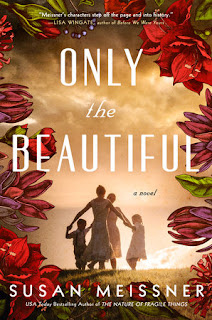Only the Beautiful, by Susan Meissner, begins in 1938 with Roseanne Maras, a caretaker’s daughter at a Sonoma Valley vineyard who sees colors upon hearing sounds. The condition distracts her at school, and her parents urge her to keep it a secret and eventually allow her to leave school early. Years later, she recalls “A dim memory of my father praying at my bedside when I was little…. He pleaded for a miraculous favor…. For the colors to leave his daughter. He was afraid for me. People will always distrust what they don’t understand. And what they distrust, they cannot love.”
After her parents die in an accident, the owners of the vineyard become guardians, keeping the 16-year-old on as a maid, and the family’s son remembers their childhood and her descriptions of the colors. She becomes pregnant and though she denies seeing colors, the guardians send her to a state home, where she is stripped of all possessions, including an amaryllis bulb that was a gift from the sister of her child’s father. Helen works as a governess for a family in Vienna with a disabled child and regrets her failure to recognize the depths of Nazi evils at the start of World War II and the inability to rescue her charge from the Nazis. The child dies soon afterward, and Helen devotes herself to rescuing and delivering other disabled children to Switzerland.
In California, an escape attempt by Roseanne fails, and soon after delivery, her infant is sent to an orphanage to await adoption. Roseanne is then sterilized by doctors who worry about her condition being hereditary, and she must wait until age 19 for release to a group home. Upon leaving, she softly tells the nurse, “It’s not right what you’re doing here…. I know you’re probably going to say what do I know about what is best for people, but I had to say this before I left.”
She settles in at the group home and finds work at a hotel, where she meets a neurologist who identifies her condition as synesthesia.
The narration resumes with Helen who returns to Vienna at the close of World War II and learns that the father of her young disabled charged arranged for his daughter's mercy killing to avoid experimentation and institutionalization. The father, a Nazi officer himself, argues that “Power like that can’t be stopped,” but Helen disagrees. “Of course it can…. It was stopped when the rest of the world finally said, ‘No more. But we waited too long.”
Helen returns to California and starts asking questions about Roseanne, a child she once befriended, challenging her sister-in-law, the vineyard’s owner, later the doctor who sterilized young women. “But how do you know her life was miserable…. What gives you the right to judge whose life has value and whose doesn’t as if you were–“ The doctor finishes for her: “As if I were God?” He goes onto defend himself to a woman who observed Nazi atrocities first-hand: “I’ve heard that before from people like you who haven’t seen what I’ve seen.”
The doctor refuses to divulge information about Roseanne, but his son who lived on the premises at the time and originally alerted security to the inmate's attempted escape, provides details about the placement.
Helen learns that she is the child’s biological aunt, confronting the doctor and others that, though single herself, she should have been given the chance to adopt the baby. Those involved with Roseanne's case justify their actions by suggesting that they had far more work than time. When leads result in dead ends, Helen does not give up and does find Amaryllis, Roseanne's child, later becoming an activist, speaking out at churches and civic clubs about mistreatment of the disabled including forced sterilization: “I realized I had a story to share about the disabled children of Austria, and at the end of my tale was the perfect entrée to telling people what was happening right here in California….”
A publisher invites Helen to write a book about her experience, which leads to finding Roseanne and reconnecting the small family.
The novel, like Helen's activism, demonstrates the parallels between the Nazi quest for their version of a perfect population with US medical goals of reducing disabilities through sterilization and poverty associated with young unwed mothers. The historical research is solid, and the characters' circumstances ring true. But Roseanne and Helen - sensible, practical, motivated, generally unflappable and cooperative when confronting horrific injustice and bad luck - are idealized protagonists, almost too good to be true. Such choices perhaps make the story more bearable for readers.
The novel's acknowledgement points out that more than 20,000 people were sterilized in California between 1909 and 1964, one third of all the sterilizations nationwide.
"Eugenic laws in 32 states empowered government officials in public health, social work and state institutions to render people they deemed 'unfit' infertile, explain Nicole L. Novak and Natalie Lira for The Conversation. "California led the nation in this effort at social engineering." The magazine also reports that such programs also targeted specific ethnic groups.


